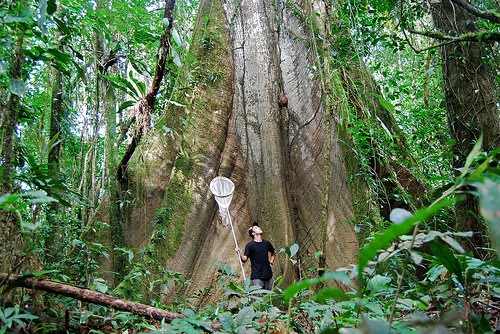Tonight I attended a special session of the Ecological Society of America’s 2011 annual meeting, entitled “Earth Stewardship in Latin America: Challenges and Opportunities,” part of a broader meeting to explore ways of “preserving and enhancing earth’s life-support systems.” Indeed, the challenges faced by stewards in Latin America are many, and they are great. To begin with, the forests, rivers, and savannahs of Latin America are home to an overwhelming majority of all species in the Americas. Yet there are few ecologists to speak of there, at least in comparison to countries further north, and particularly the United States. One of the session’s organizers put it well: if you wanted to map where the Americas’ species are, as well as where the scientists, financial resources, and technical capacity are to study them, you’d in fact need two separate maps. Obviously, Latin America has no hope of environmental stewardship if there are no ecologists trained for the job. But why are there so few ecologists in Latin America, despite its vast natural wealth and mounting ecological concerns? The answer, I believe, is fundamentally an economic one. There simply isn’t enough money to train them, and even less to provide any powerful incentive to return once they’ve left to pursue careers in ecology abroad. And what’s worse, these economic woes show no signs of drastic improvement, at least not on any timescale that will be meaningful to addressing the current biodiversity crisis. So we might be wise to consider alternatives. I think one worthwhile approach is the promotion of collaboration among stakeholders, and since Latin America’s ecosystems, and primarily its tropical forests, are among the earth’s most significant “life-support” systems, that puts us all squarely in the stakeholder category. That said, resources should be allocated from where they are available, in order to meet a challenge whose consequences we all face. Being, myself, a passionate, aspiring tropical ecologist and conservationist, I certainly believe and hope that together, we as a global community of concerned and aware citizens, scientists, and neighbors, can rise to meet the challenge of earth stewardship in Latin America.
Amazon Giant, Yasuni National Park, Ecuador

There’s an old Cree Indian prophecy that goes "Only after the last tree has been cut down... Only after the last river has been poisoned… Only after the last fish has been caught, only then will you find that money cannot be eaten." I find these words clever yet profoundly insightful, and more meaningful today than ever. Across the globe, vital ecosystems are disappearing at an alarming rate, a rate matched only by the speed with which the species inhabiting those systems are falling to extinction. This is particularly true in the Neotropics, where an extraordinary diversity of plants and animals are struggling with the catastrophic consequences of widespread deforestation and pollution. Many of the forests’ secrets elude ecologists, secrets whose answers will be essential if we are to protect the awesome biodiversity they contain. I study Neotropical butterfly ecology, with the hope that I may contribute to a better understanding of these wonderful creatures, and help conserve them in an uncertain future. Follow me during my work and adventures throughout Latin America here!